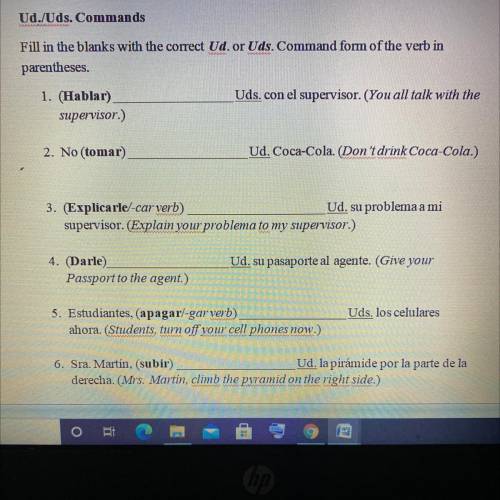Fill in the blanks with the correct Ud or Uds. Comman form of the verb in parentheses
...

Spanish, 14.11.2020 06:00 shelbellingswo
Fill in the blanks with the correct Ud or Uds. Comman form of the verb in parentheses


Answers: 3


Another question on Spanish

Spanish, 22.06.2019 02:30
You’ll need to set habits that will tie you to spanish and its cultures even beyond the classroom. students who become lifelong learners of spanish have some basic characteristics and habits that you should develop if you want to get the most from your experience learning spanish. lifelong learners: have friends with whom they regularly converse in the target language. (this could be friends in school, neighbors or friends in the community.) regularly get information from target language sources (newspapers, magazines, internet spanish related news group (with parent’s approval), tv programs, radio, etc. that are produced by and for native speakers.) participate in activities of the target culture (celebrating holidays, seeing movies or plays of/in the target culture, preparing or eating dishes from the target culture, reading books or magazines from the target culture, etc.) someone who has developed these habits is on the way to becoming a lifelong learner. these types of habits reinforce a strong connection to the language and culture and develop a love and better understanding of that culture. think for a minute about the resources available. do you have friends who are native spanish speakers? do you ever watch spanish channels on television? you can probably think of several online sources. maybe you have some stores or restaurants in your community that are owned or frequented by spanish speakers. also think about when you could participate in spanish-related activities on a regular basis—remember that it’s setting the habits that will make the most difference. using the table below as a guideline, write out a plan for starting new habits. for the language or culture resources column, try to identify three different resources: 1. a friend or contact 2. an information source, and 3. a cultural activity. in the what i will do column, describe as specifically as you can what you will do. and in the when i will do it column, write when you plan on doing these activities. see the sample below to see how you might fill out your own table. you will have opportunities to follow up and report on your regular practice of engaging spanish resources close to home. you will be asked in a follow up assignment to report on what you have done. language or culture resources: what i will do: when i will do it: 1 1 1 2 2 2 3 3 3 *example: language or culture resources: what i will do: when i will do it: 1. spanish exchange student 1. i will practice spanish…. 1. m-f between 9 and 10 am. 2. spanish newspaper: 2. i will read an article a week 2. every tuesday at 3: 00pm 3. spanish films 3. i will see a spanish film every month 3. the first friday of every month. if you are still unsure where to begin, ask your teacher for additional ideas that can get you started. regardless of how you go about making your spanish cultural connection, be sure to make a plan and to think about a longer-term strategy for getting the most from your time with your chosen resources.
Answers: 1

Spanish, 22.06.2019 05:00
Conjuga los verbos en el pretérito (past tense). é í ó yo no __ (comprar / pagar) mucha ropa, porque no tenía mucho dinero. conjuga los verbos en el pretérito (past tense). é í ó esta mañana mi hermano y yo __ (beber / comer) el cereal. conjuga los verbos en el pretérito (past tense). é í ó ayer la clase de español __ (escuchar / prestar) a la profesora. conjuga los verbos en el pretérito (past tense). é í ó ¿a qué hora __ (llegar / llevar) tú a la escuela esta mañana? conjuga los verbos en el pretérito (past tense). é í ó los estudiantes __ (escribir / hablar) un informe en la clase de inglés ayer. conjuga los verbos en el pretérito (past tense). é í ó el domingo pasado hannah __ (escoger / escribir) un vestido bonito de forever 21. conjuga los verbos en el pretérito (past tense). é í ó yo __ (abrir / asistir) a la escuela intermediaria dwyer el año pasado. conjuga los verbos en el pretérito (past tense). é í ó ¿ (abrir / andar) tú la puerta del carro para tu mamá anoche? conjuga los verbos en el pretérito (past tense). é í ó mis amigos y yo __ (encontrar / leer) una tienda muy bonita anoche. conjuga los verbos en el pretérito (past tense). é í ó muchos estudiantes __ (caminar / montar) a la escuela esta mañana.
Answers: 1

Spanish, 22.06.2019 22:30
Compare your daily life with what life would have been like at chichen itza. in what ways is it similar? in what ways is it different? write your answer in english.
Answers: 2

Spanish, 23.06.2019 00:30
Marcos no ) el pelo después de ducharse. answer for blank 1: answer for blank 2:
Answers: 2
You know the right answer?
Questions


Biology, 07.01.2020 23:31



English, 07.01.2020 23:31

Health, 07.01.2020 23:31

Mathematics, 07.01.2020 23:31

Mathematics, 07.01.2020 23:31


Health, 07.01.2020 23:31


Mathematics, 07.01.2020 23:31


Mathematics, 07.01.2020 23:31



Mathematics, 07.01.2020 23:31






